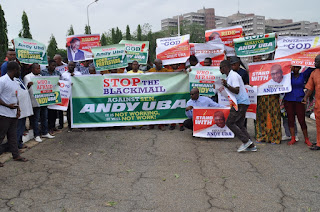SANUSI LAMIDO IN THE LAWMAKER'S DEN . . . By Wale Bakare
The recent call by our lawmakers to obliterate the sole autonomy of the nation’s number one financial institution- the central Bank of Nigeria has continue to generate some sort of strong furor. The national assembly is seeking to reduce the power of the central bank, a legislative measure according to the lawmakers to ensure transparency and accountability. Prior to these call, the apex bank managed by the controversial governor of the central bank, Mallam Sanusi Lamido who has continually ruffled a lot of feathers under his banking reforms. I could recall vividly his Infamous decisions that sparked off the revolution in the banking system; with the sacking of the managing directors of five banks and replacing them with CBN appointed managers and the subsequent publications of the names of some highly placed Nigerians who are major bank debtors. . These moves were no doubt in favour of the country’s financial institution aimed at restoring sanity back to the system and the economy as a whole. Sanusi’s numerous decisions in the past has often been greeted with mixed feelings, while many of his pundit applauds his level of impudence; his political antagonist will continue to axe him by using his own reforms against him.
The CBN governor may have recently aroused the interest of the lawmakers with many of his policies they considered aristocratic in nature and his adventure into politics of being a charity organization with his recent donations to victims of the bomb blast in Niger, Yola and Kano State. The news of his exploit in the troubled Northern zone spread like wild fire and thus sparking off a row within the chamber as the lawmakers were thrown into a nervous moment. The aggrieved legislators subsequently summoned the CBN governor to an emergency session to explain the motive behind his actions. This move may have been unconnected with the tussle to whittle down the powers of the Apex Bank
Industry professionals, past national leaders and indeed Nigerians have expressed their desire to kick against the highhandedness of the law makers in handling the issue. Interestingly, the tweet meet set up by @budgetNg to interview one of the lawmakers in the house, Senator Bukola Saraki who surprisingly defied his colleagues to support the full autonomy of the CBN act. As a former bank professional, the Senator emphasized on the need to insulate CBN from political interferences in the discharge of its regulatory function; citing the danger it portrays on the obstruction of the in-flow of investments into the economy. Also, a former Head of State, General Yakubu gowon in a forum in Lagos pointed out that the independence of the apex bank should be preserved, noting that any interference in the affairs of the bank by the politicians would affect its operation. He attributed the steady economic growth and development recorded by the country during his own administration to the independence of the CBN under the late Clement Isong who was then the CBN Governor.
The bill proposed to amend the CBN act may have entered its second reading in the house, but the lawmakers are yet to give us credible reasons for their actions. If they are aggrieved with Sanusi Lamido’s personality that should be treated and settled outside the CBN confines rather than politicize the bill to favour a few minority. Combating stiffer laws to punish and reduce insecurity and terrorism in the country should be prioritized at the expense of trivial issues. Nigerians must resist the attempt to subjugate the CBN autonomy. It will be a violation of fundamental human right and a defeat to our nascent democracy if the lawmakers go against the wishes of well meaning Nigerians to distort the CBN act.




Comments
Post a Comment